From the Top
President’s Message
Friends and Colleagues,
 As you may know, until last November, I worked for my company as an independent contractor with plenty of free time. In one of those good-news bad-news situations, at the end of last year, I received a nice promotion, becoming a salaried employee. In my new position (a director), I oversee more than 20 people in four different markets. As you can imagine, my free time took a significant hit.
As you may know, until last November, I worked for my company as an independent contractor with plenty of free time. In one of those good-news bad-news situations, at the end of last year, I received a nice promotion, becoming a salaried employee. In my new position (a director), I oversee more than 20 people in four different markets. As you can imagine, my free time took a significant hit.
This clearly has impacted my tenure as PSWA President, as my time for working on PSWA matters is limited to weekends and competes with my writing-related work. Neither of those activities can receive any attention during the work week.
As a result, I’ve concluded I must step back from the Presidency. This has nothing to do with my appreciation for the PSWA, as I’m a big supporter of the association and want to see it grow and thrive. And of course I look forward to seeing many of you at the annual conference. My only concern is that I’m doing a poor job as the organization’s leader and don’t want to hold it back.
Steve Ditmars, our Vice President, is willing to step into the President’s role. That means that going forward we have two board positions open: Vice President and Secretary, as Peg Roche also is leaving the board. We’ll try to fill those gaps quickly, but, meanwhile, I look forward to seeing you in July.
Colin Conway
President
Vice President’s Report
Greetings, Public Safety Writers!
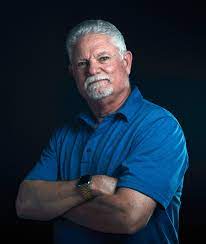 As summer begins, the annual Las Vegas conference is almost here. It’s our 20th! The Board has been discussing it for months now, and I know from all Mike Black’s hard work that this one will be spectacular (see his report). In fact, many people work very hard to make this event happen smoothly, and you’ll hear my thank-yous to them there.
As summer begins, the annual Las Vegas conference is almost here. It’s our 20th! The Board has been discussing it for months now, and I know from all Mike Black’s hard work that this one will be spectacular (see his report). In fact, many people work very hard to make this event happen smoothly, and you’ll hear my thank-yous to them there.
The PSWA continues to crawl out of the hole dug for us by COVID. I’m thankful it has been mostly gone for a few years and that our membership and conference attendance are slowly growing back to the pre-2020 levels.
With that in mind, we should warmly welcome our new members and give a special thank you to those who helped recruit them. The most effective person to recruit a new member is a friend or acquaintance. If you know a public safety writer who is not a member, reach out. Tell them about the benefits of being part of this organization, including the conference. New faces, new experiences, new ideas—these are the lifeblood of any organization. Yes, we need them, but it’s a two-way street: We can also help them via our listserv of experts, our conference, and our Facebook pages. And, coming soon, an improved Web site (fingers crossed).
I look forward to July and talking to members old and new. I hope you’ll be one of them!
Steve Ditmars
Vice President – Membership
Treasurer’s Report
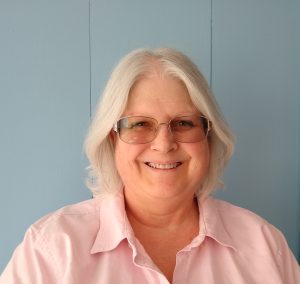 The annual PSWA conference offers a variety of ways to put your name and your books in front of a tremendously receptive audience! Your advertising and sponsorship support are vital to our success; without them, the conference wouldn’t be the great experience it is, year after year.
The annual PSWA conference offers a variety of ways to put your name and your books in front of a tremendously receptive audience! Your advertising and sponsorship support are vital to our success; without them, the conference wouldn’t be the great experience it is, year after year.
This year’s meeting is shaping up to be another memorable one, and I look forward to the many creative ways our members participate. Even members not able to travel to Las Vegas this year can make their presence known by advertising in the program or contributing pens, bookmarks, and other swag.
If you have any questions about the opportunities described below, please reach out to me at peacock.kelli3@gmail.com.
Conference Program Advertising
- Deadline: send to Kelli via email at peacock.kelli3@gmail.com, no later than Monday, June 9, 2025
- File format: .doc, .pdf, or .jpg. All ads will be printed in color.
- Inside front cover, or outside back cover: $250; Size: 8.5 x 11 inches (trim); 8.875 x 11.25 (bleed)
- Full inside page: $200; Size: 8.5 x 11 inches (trim); 8.875 x 11.25 (bleed)
- 1/2 inside page: $100; Size: 7 x 4.625 inches (horizontal) or 3.5 x 9.25 (vertical)
- 1/4 inside page: $50; Size 3.5 x 4.625 inches (vertical)
- Payment via PayPal to PSWAtreasurer@gmail.com
We can accommodate as many inside ads as we receive. Cover spots are, of course, limited, so send in your payment promptly to reserve your spot. The opportunity to advertise is open to any PSWA member whether attending this year’s conference or not.
Conference Bag Swag
SWAG IS NEEDED TO ADD TO OUR BEAUTIFUL SPONSORED BAGS!
Every year we receive fun items to place in the conference bags. The possibilities are endless—pens, postcards, keychains, bookmarks, mini sewing kits, eyeglass cloths, and the like. Your items should be crime-related or promotional—and we would love to have them. All we ask is they be small items and non-breakable—NOT mugs, cups, water bottles, etc. Remember, members have to travel home with them! And no more than 50 of each item.
Mail by Monday, June 30, 2025, to:
Kelli Peacock
8983 East Orchid Vine Drive
Tucson, AZ 85747
Thank you for your participation!
Kelli Peacock
Treasurer
2025 Conference Update
We’re on the cusp of The Roaring Twentieth, our next PSWA Conference July 17-20, 2025, and we’re pleased by the number of new and longtime members who are planning to attend what promises to be an informative, helpful, and lively experience! As Steve said above, this anniversary year will be extra-special!
Program Highlights
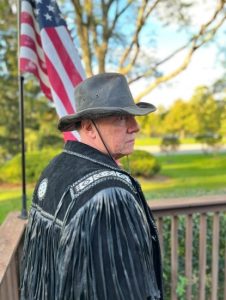 Friday morning has retired LAPD detective and acclaimed writer, member Mike Brandt with “Rolling Out a Story.” He will detail some of the tricks to perfecting a dynamite story and a knockout ending. After a long career as an LAPD homicide detective specializing in gang crimes, Mike directed the Health Care Fraud Department. He’s a marathon runner, mountain climber, and, it goes without saying, an accomplished author. Maybe he’ll even reveal how he came by his pseudonym, Brandon Michaels.
Friday morning has retired LAPD detective and acclaimed writer, member Mike Brandt with “Rolling Out a Story.” He will detail some of the tricks to perfecting a dynamite story and a knockout ending. After a long career as an LAPD homicide detective specializing in gang crimes, Mike directed the Health Care Fraud Department. He’s a marathon runner, mountain climber, and, it goes without saying, an accomplished author. Maybe he’ll even reveal how he came by his pseudonym, Brandon Michaels.
Friday afternoon, Bob Doerr will present “From OSI to NCIS to CID—Law Enforcement in the Military.” Bob, a retired Air Force colonel and 28-year veteran, is one of the real life military heroes we write about. And he’s a talented writer. He’ll tell us how law enforcement works in the various branches of the military, learned through his specialization in criminal investigations and international counterintelligence. Forget what you see on TV; Bob is the real deal.
Saturday morning, acclaimed actor and audiobook narrator Scott Ellis will talk about “From Print to Audio—Producing an Audio Book.” As some of our members have found, audio is a great way to reach a whole new audience. Scott has narrated more than 100 audiobooks himself, and he and his wife, Josie, own Ellis-Audiobooks. They’ve helped many authors bring their first projects to audio.
Saturday afternoon, Police Sergeant Joshua Lee will take you for a walk on the wild side with “Navigating the Dark Web: What You Need to Know.” You’ve heard of the dangers of the Dark Web. Now we’ll go there. Josh is with the Organized Crime, Human Trafficking, and Complex Financial Crimes Division of the Mesa, Ariz., Police Department. He’ll take us through the ins and outs of this risky territory, giving an inside look at what it takes to navigate it. Fasten your seatbelts for this one!
Sunday Morning, we’re fortunate to have Austin Camacho returning with “Write Better: Draft, Rewrite, and Edit.” When authors ask me, “How can I improve my writing?” I think of a number of fundamentals. But one thing that’s not obvious is that their focus should depend on what stage of the process they’re in. Writing a first draft is different from rewriting or editing, and Austin will show you what to focus of each stage needs to be.
In Addition . . .
We’ll have publishers on hand to talk about the present state of the industry. They’ll also be available to listen to author pitches, so it’s a valuable opportunity. Don’t miss out! The Writing Competition Awards Ceremony (more below) will be Saturday night, offering great food and a cash bar.
Pre-Conference Workshop
And don’t forget our Pre-Conference Workshop Thursday, July 17, 9 am to 3:15. This year authors Kelli Peacock and Frank Scalise will be running things. These two pros have a fantastic line-up of guest instructors. Our newsletter editor, Vicki Weisfeld, will lead off with “Use Your Tools. The Words that Make a Difference.” In today’s marketplace, skillful writing can mean the difference between acceptance and rejection of your manuscript and is key to building a fan base.
Kelli Peacock will be covering subplots. She’ll answers such questions as, how many subplots do you need one in your novel? How do you weave them into the storyline? And how many subplots is too many? Real life is loaded with subplots—it’s complex and messy. As authors we must complicate the lives of our protagonist and even secondary characters through subplotting.
Frank Scalise then takes on “Managing Your Series.” Frank is the award-winning author of many books and series. He’ll talk about managing a single series over time, including characters who change and those who don’t, continuity across books, keeping stories fresh, and creating emotional anchors. He’ll also discuss how an author can manage multiple series, including the tricky issue of having characters from one series pop up in another. What makes that work?
Rounding the workshop sessions out, Colin Conway talks about a key issue in book promotion, “Developing Your Author Brand.” It’s no secret that not just your books, but your personality, your profile, your network, and more can affect success in today’s publishing marketplace. In this session, you’ll learn how to be a stronger competitor.
Manuscript Critique
Authors attending the workshop may elect to have their work critiqued and have a one-on-one session with a published author. Submitted manuscripts are limited to 7000 words, and must be formatted in Times New Roman, 12 point, and double-spaced in a document compatible with MS-Word. Critique comments and suggestions will be provided via the Track Changes feature.
This critique is FREE for workshop attendees; however, applying standard market rates, suggests a conservative value of $350. Since time is getting short, check with Kelli (peacock.kelli3@gmail.com) or Frank (fscalise3@gmail.com) about logistics.
Hotel Room Discount
The Orleans Hotel offers a 35 percent room rate discount for PSWA members attending the meeting. Book your room online by clicking this link to obtain the discount. If you make your reservation by phone (1-800-675-3267), provide this code (PSWG25C), and you will receive the reduced rate.
Take it from me, the PSWA Conference is one of the friendliest and best of its kind, and I’ve been to a ton of them. Even if this is your first one, you won’t leave a stranger. Join your talented colleagues at the Roaring 20th. What are you waiting for? Sign up today! I hope to see you in Vegas.
Michael A. Black
Conference Coordinator
Writing Competition Report
Hello everyone,
 Happy spring. The writing competition is moving right along. I’ve received most of the judges’ scores, and, again, it’s been a very tight competition.
Happy spring. The writing competition is moving right along. I’ve received most of the judges’ scores, and, again, it’s been a very tight competition.
The gold, silver and bronze emblems for our new awards look fantastic. I’m pleased winners can say, “I won a PSWA Medallion Award.” Again this year, the highest-scoring published book, fiction or non-fiction, will receive the Marilyn Meredith Award for Excellence in Writing. While I always look forward to giving winners their awards in person, winners who cannot attend will receive their awards by mail.
The judges for the published books will convene soon to choose the best book cover. They take into account more than the front of the book; they also consider the back blurb. They want it to convey what the book is about, without making them feel they’ve already read it.
Saturday night will be our awards ceremony. Attendees are encouraged to come in the costume of their favorite mystery/crime/thriller book character. Show up in the best costume and you’ll receive a $30.00 gift credit at the bookstore.
On Sunday, we’ll arrange the award-winning books on a special table. Not only can you buy an excellent book, you can ask the author to autograph it.
The conference is getting close, and I’m excited. I hope to see many of you there.
Barbara M. Hodges
Writing Competition Chairperson
NOW HEAR THIS:
If you want to sell your books at the conference, you can bring them with you or ship them to the hotel ahead of time.
If you ship them, use this format on the mailing label, so they don’t go astray:
Business Center
Public Safety Writers Association Conference (YOUR NAME*)
Orleans Hotel & Casino
4500 West Tropicana Avenue
Las Vegas, NV 89103
*OR the name of someone you designate. If there’s no name, the Business Center won’t release the box.
The Business Center will charge a handling fee, which depends on how much the box weighs, starting at $15.00.
The Business Center closes at noon on Saturday. It may or may not be open on Sunday to handle a package you want returned to you. Watch for Mike Black’s updates on the Sunday schedule on the listserv. You’re responsible for making your book return arrangements. FYI, the hotel Business Center’s phone number is 702-365-7060
SOME FRIENDLY ADVICE: Though you can bring/send as many books as you wish, table space in the meeting room is VERY limited. The bookstore table is shared space. There’s room to display only 3-4 copies of each book. If you have multiple books, you may want to rotate them. When your books are sold, you can replenish them. The conference ends Sunday, by which time any unsold books must be removed.
Member News
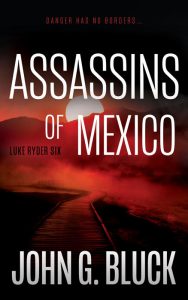 Assassins of Mexico, by member John Bluck, is coming July 8 from Rough Edges Press. It’s the sixth in his Luke Ryder series of thrillers. John says that the story’s locations include various US National Parks out West, including Yellowstone and the Grand Canyon. Although Assassins of Mexico can stand alone, he says, you might want to catch up on the past adventures of Luke Ryder by reading the earlier books in this well-regarded series, two of which won awards from PSWA. Series. John has to miss this year’s conference, but sends thanks to the PSWA members who’ve helped him get law enforcement procedures right!
Assassins of Mexico, by member John Bluck, is coming July 8 from Rough Edges Press. It’s the sixth in his Luke Ryder series of thrillers. John says that the story’s locations include various US National Parks out West, including Yellowstone and the Grand Canyon. Although Assassins of Mexico can stand alone, he says, you might want to catch up on the past adventures of Luke Ryder by reading the earlier books in this well-regarded series, two of which won awards from PSWA. Series. John has to miss this year’s conference, but sends thanks to the PSWA members who’ve helped him get law enforcement procedures right!
Member Scott Decker is participating in an eight-part podcast series from Wolf Entertainment called Aftermath: The Hunt for the Anthrax Killer. You’ll remember Scott was part of the team that investigated “the deadliest attack you’ve forgotten.” A few short weeks after 9/11, anthrax-laced letters “sent the nation into panic, shutting down government buildings and overwhelming law enforcement. The FBI launched one of the largest investigations in its history, unraveling a complex web of scientific clues and personal cost.” And, Scott is the perfect person to tell this story—whose hidden consequences linger today—because he was there. Click this link to listen to the series.
 Cindy Goyette’s first cozy mystery—Diamond in the Ruff—was released in early May. In it, Charlie Calderbank is helping her aunt who runs a pet hotel, Wiggle Butt Manor, located in the small northwest US town of Orca Cove. When one of the dog owners is murdered, Charlie’s aunt is the prime suspect, and Charlie sets out to find the real killer. Along the way, she uncovers secrets that may make her the next victim. And maybe finds a little romance with a local cop.
Cindy Goyette’s first cozy mystery—Diamond in the Ruff—was released in early May. In it, Charlie Calderbank is helping her aunt who runs a pet hotel, Wiggle Butt Manor, located in the small northwest US town of Orca Cove. When one of the dog owners is murdered, Charlie’s aunt is the prime suspect, and Charlie sets out to find the real killer. Along the way, she uncovers secrets that may make her the next victim. And maybe finds a little romance with a local cop.
In JL Greger’s Crazy Like A Goat, Sara Almquist and her FBI colleagues investigate the Albuquerque murder of a retired professor. Why did someone poison his booze with methanol? Did he and his cronies know too much about the dark doings at a senior living center? Or was one of his neighbors tired of his pranks—including acting crazy like a goat? This is the 14th mystery in Janet’s Science Traveler series!
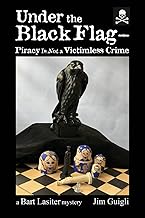 Jim Guigli, who not only wrote but did the entire design (size, text, layout, and covers) for his new PI novel, Under the Black Flag—Piracy is Not a Victimless Crime, is a finalist in the “Best Overall Design (Fiction)” category of the Next Generation Indie Book Awards. To promote the novel, Jim, along with PSWA members James L’Etoile and Mike Brandt, attended a Crime Time hour with local crime readers and writers sponsored by the Capitol Crimes (Sacramento) chapter of Sisters in Crime. The event was hosted at the El Dorado Hills, Calif., award-winning bookstore Face in a Book. Under the Black Flag received a nice 4-star review from Steve Steinbock in the May/June (current) issue of Ellery Queen Mystery Magazine. Steinbock called it “a highly entertaining, cleverly written, and loving satire of PI fiction.”
Jim Guigli, who not only wrote but did the entire design (size, text, layout, and covers) for his new PI novel, Under the Black Flag—Piracy is Not a Victimless Crime, is a finalist in the “Best Overall Design (Fiction)” category of the Next Generation Indie Book Awards. To promote the novel, Jim, along with PSWA members James L’Etoile and Mike Brandt, attended a Crime Time hour with local crime readers and writers sponsored by the Capitol Crimes (Sacramento) chapter of Sisters in Crime. The event was hosted at the El Dorado Hills, Calif., award-winning bookstore Face in a Book. Under the Black Flag received a nice 4-star review from Steve Steinbock in the May/June (current) issue of Ellery Queen Mystery Magazine. Steinbock called it “a highly entertaining, cleverly written, and loving satire of PI fiction.”
Mike Black’s western novel of two stories told as one, Where Legends Lie, is now available on the Genius Books website as well as Amazon. Additionally, his first Bass Reeves novel, Legends of the West, was re-released in paperback by Genius Books in April. A second book in the series, Retribution Trail, is scheduled for a summer release, hopefully by conference time. Also, Mike’s long short story, “Nobody Cares,” appeared in the May/June issue of Alfred Hitchcock’s Mystery Magazine. He started the story as a workshop project at the conference several years ago.
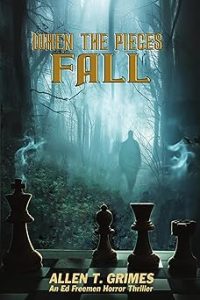 When the Pieces Fall, a new Ed Freeman thriller by Allen T. Grimes is now available on Amazon. The teaser reads: “Somerton Police Captain Ed Freemen thought he had seen his last demon when he left Lake Hope, but evil has unfinished business with him.” When he answers a call about a body in a field, he expects another routine case—until the “victim” is found alive, his mangled body impossibly tied to a gruesome farm accident. Watching from the crowd is Ed’s old mentor, but he died six months before. More bodies turn up, each death more cryptic than the last. This isn’t just a murder spree. It’s a supernatural conspiracy, a diabolical game of chess, with Ed as the king under siege. Checkmate is coming, and if Ed loses, it will cost him everything—including his immortal soul.
When the Pieces Fall, a new Ed Freeman thriller by Allen T. Grimes is now available on Amazon. The teaser reads: “Somerton Police Captain Ed Freemen thought he had seen his last demon when he left Lake Hope, but evil has unfinished business with him.” When he answers a call about a body in a field, he expects another routine case—until the “victim” is found alive, his mangled body impossibly tied to a gruesome farm accident. Watching from the crowd is Ed’s old mentor, but he died six months before. More bodies turn up, each death more cryptic than the last. This isn’t just a murder spree. It’s a supernatural conspiracy, a diabolical game of chess, with Ed as the king under siege. Checkmate is coming, and if Ed loses, it will cost him everything—including his immortal soul.
The short story “Buried Secrets” by Vicki Weisfeld will be included in Flannel Fedoras, a forthcoming anthology of PI stories set in the 1990s, edited by Michael Bracken. Each story had to incorporate something specific from that era in a meaningful way. Turns out there were a lot of potential choices (the 90’s were wild!)–and “Buried Secrets” weaves in elements of the OJ Simpson trial.
The Writing Craft: Upping Your Game
Witty dialog for bad guys and gals
Witty dialog in crime books serves multiple purposes. It shows characters’ personalities and helps readers bond with them. It’s also a good break from the unrelenting tension of otherwise dark-themed books. I’ve enjoyed the wit quite a few leading crime and thriller authors put in their books. John Sandford, Tami Hoag, and Tim Sullivan come mind immediately. I’m sure you have favorites too. However, I’ll make an exception for a UK thriller in which Every Last Line of Dialog was some snarky comment meant to be witty, but which rapidly became exceedingly tiresome. Here’s a short article from Raconteur Press that looks at how witty dialog helps films, too, with video excerpts of a few memorable scenes. Included is a don’t-miss skit with Dragnet’s Jack Webb and Johnnie Carson about clean copper clappers!
Not just what your characters say, but how they speak
 This excellent article by crime and mystery writer Elle Jauffret talks about plusses and pitfalls when writing accented speech. Accents “can place a character geographically, hint at their cultural background, or suggest social standing—all without explicit exposition.” In an increasingly polyglot world, she says, representing people authentically is “both more important and more challenging.”
This excellent article by crime and mystery writer Elle Jauffret talks about plusses and pitfalls when writing accented speech. Accents “can place a character geographically, hint at their cultural background, or suggest social standing—all without explicit exposition.” In an increasingly polyglot world, she says, representing people authentically is “both more important and more challenging.”
The biggest pitfall is stereotyping: giving villains vaguely Eastern European accents, using Southern and rural accents to convey a lack of sophistication, or thick Italian accents to suggest organized crime.
The author offers several tips: show restraint; focus on cadence and word choice (Frank McCourt’s Angela’s Ashes is a graduate course in Irish speech); do your research; make sure your characters are fully developed so that speech is only one part of their personas.
The power of memoir
Leavin’ On a Jet Plane
By John Schembra
 Early in the morning, after a fitful night of off-and-on sleeping, I was awakened by someone sitting on my bed. I half-opened one eye, not willing to come fully awake at that point, and was surprised to see my father sitting there, dressed and ready to leave for work. I closed my eye, as it was apparent he didn’t realize I was awake. He very gently brushed the hair off my forehead and away from my eyes. He took my hand in his and just held it for a little while, sitting quietly next to me. I lay there not moving or reacting.
Early in the morning, after a fitful night of off-and-on sleeping, I was awakened by someone sitting on my bed. I half-opened one eye, not willing to come fully awake at that point, and was surprised to see my father sitting there, dressed and ready to leave for work. I closed my eye, as it was apparent he didn’t realize I was awake. He very gently brushed the hair off my forehead and away from my eyes. He took my hand in his and just held it for a little while, sitting quietly next to me. I lay there not moving or reacting.
He arose and slowly walked to the bedroom door. Stopping, he turned toward me and said, very softly, “I love you, son. Be careful, and stay safe.”
As he turned to leave, I replied, “I love you, too, Dad.” He paused for a moment, and I knew he had heard me. If I didn’t know better, I could swear he was crying.
Twenty-four hours later, I was in Vietnam.
Publishing Tips and Travails
Interested in Kickstarter?
By Frank Scalise
 Recently, I decided to give the crowd-funding platform Kickstarter a try. The first book in my fantasy series (under my pen name Frank Saverio), A Burnt Summer, seemed like a good project to experiment with this author tool. For those unfamiliar with Kickstarter (or crowd-funding in general), here’s a brief YouTube summary.
Recently, I decided to give the crowd-funding platform Kickstarter a try. The first book in my fantasy series (under my pen name Frank Saverio), A Burnt Summer, seemed like a good project to experiment with this author tool. For those unfamiliar with Kickstarter (or crowd-funding in general), here’s a brief YouTube summary.
I recommend taking a look at my specific campaign before reading the rest of this article, for better context. As you’ll see, my project failed to reach its funding goal. To better understand why I had this result, the PSWA newsletter editor asked me the following questions. Here are my responses:
- Was your funding goal appropriate, similar to other books, etc.? I set it at $1500, which was mid-range for the fantasy novels I saw on the platform. My cover was hand-drawn by artist Zach McCain, more than I usually spend for cover art. Additionally, he did character drawings for me, adding to the expense.
- What outreach did you do to reach audiences interested in that genre of books (recognizing PSWA is not a perfect fit)? I posted multiple times throughout the campaign (launch, mid-term, nearing end) on the four social media platforms I use (Facebook, X, Insta, Threads). On Facebook, I posted in relevant reading and promotional groups. I posted in relevant Reddit subs. I mentioned the project in podcast interviews leading up to the launch. Lastly, I sent out two separate emails to my newsletter list to let those readers know (though, it should be noted, those readers signed up for a Frank Zafiro newsletter, so interest in a fantasy novel wasn’t high).
- Were your reward tiers attractive? I believe so. They were in line with other books I’d seen. Backers had the options of an ebook, paperback, or both. At slightly higher levels, a special edition paperback and hard cover. And there were a couple of high-expense, specialty options such as character naming and author appearances.
- What changes to any of the above would you make in future? If I were to try to launch another book via Kickstarter, I think I’d use similar reward levels. I asked myself, what would I want if I were to back someone’s book (or game)? I’d want a copy of it, first and foremost. If I were incredibly excited about the project, I’d want a special version.
- What surprised you? Bad surprise—that it didn’t fund. I honestly thought it would. I even had stretch goals prepared in case things went crazy. Good surprise—A Burnt Summer was the first project many of my supporters had ever backed. That was pretty cool, and I’m grateful for that support. Worst surprise—the sheer volume of vultures who swooped in with their offers to market this campaign. They sent me emails, hijacked social media posts, posed as fellow authors who were “blown away by your campaign” and “just want to help,” and so forth. All had the same goal—to separate me from my money.
- Was Kickstarter easy to work with? It really was. I took the time to educate myself before diving in, but the interface is easy and streamlined. Kickstarter walks you through each stage and even makes recommendations based on what successful campaigns have done in the past. For example, something like 97% of successful campaigns have a video introduction. That convinced me to do one, even though it was time-consuming. Lastly, when I needed customer support to change which bank account I intended to use, the response was quick and took care of matters within a day.
- What’s your bottom line? Would you try it again? I don’t know. Nothing about the process itself soured me, that’s for sure. But the fact that it didn’t fund needs to be considered. I still intend to write and publish A Burnt Summer, if perhaps not as soon as I would have. Regardless, if the book and my Frank Saverio pen name gain a following, it might make sense to try it again for the second book or for the remainder of the series. Most of all, this failed campaign told me that having an established audience or newsletter is probably crucial. Aside from that possible approach, I don’t think I’d do another one, especially since crime fiction is my main gig, and that genre doesn’t tend to do well on Kickstarter (romance and fantasy do much better).
Ultimately, everything we try in support of our art is worth the effort. A friend of mine is fond of saying, “It isn’t failure, it’s feedback.” In addition to the marketing feedback this failed campaign gave me, I learned that PSWA members are very supportive of other members… even when a book is outside their preferred genre.
I’d be curious to hear what other members think. When this newsletter comes out, I’ll start a discussion thread to hear your thoughts.
Keeping track
A result of authors’ frustration with keeping track of the places they’ve submitted their work, several people have developed systems to handle that. Here are four. Maybe one of them will exactly suit your needs, or would, with a little tweaking:
- Alicia de los Reyes Submission Tracker: A free Google Docs spreadsheet designed for writers to monitor their submissions. Writers’ Spreadsheet – Alicia de los Reyes
- Nathaniel Tower’s Advanced Submission Tracker: An Excel template offering detailed tracking, including acceptance rates and earnings. Free Downloads for Writers | Nathaniel Tower
- Neon’s Excel Submissions Tracker: A simple yet effective Excel spreadsheet to keep track of submissions, with features like color-coded statuses – Excel Submissions Tracker – Neon
The above three trackers are mainly designed for books and use spreadsheets, which I’m no expert with. To track short story submissions, I use a table I created in Word. It’s simple, and lists stories alphabetical-by-title (the trick is remembering the title). The table has these headings: Title/Word Count, Market (that is, the publication/s I sent it to), Deadline, Date Sent, Response Date, Reprint OK After (time period).
If a story is accepted, I use the “fill with color” function to color in the cell with the story title and the lucky [!] publisher’s name. A story that has trouble finding a home can develop a very loooong “Market” box, but this prevents the embarrassment of sending a story to the same place twice.
How podcast guests can maximize the opportunity
 An estimated 210 million Americans age 12 and over have listened to or watched a podcast. Authors are attractive (and motivated) podcast guests. The award-winning book marketing website BuildBookBuzz run by my friend Sandra Beckwith recently posted an article on how to make the most of podcast interviews.
An estimated 210 million Americans age 12 and over have listened to or watched a podcast. Authors are attractive (and motivated) podcast guests. The award-winning book marketing website BuildBookBuzz run by my friend Sandra Beckwith recently posted an article on how to make the most of podcast interviews.
She summarizes the advice from a baker’s dozen experts, and it makes interesting reading. In a nutshell, the experts say:
- Prepare for the interview (no matter how comfortable you are in an interview situation, don’t wing it!)
- Share information about your guest role with your network both before and after the episode goes live
- Ask the producer or host for audio, video, and graphics that you can use in promoting your appearance
- Leverage that experience for more podcast interviews or as a door-opener for other opportunities
If you don’t subscribe to the free BuildBookBuzz newsletter, you’re missing some great tips!
Sale of Ellery Queen and Alfred Hitchcock Mystery Magazines
You may have heard that, in February, Penny Publications sold the stalwarts of short mystery and crime fiction—Ellery Queen and Alfred Hitchcock Mystery Magazines—along with their science fiction and fantasy titles, to Steven Salpeter and a group of investors. Right around that time, long-time EQMM editor Janet Hutchings retired, with her position now filled by EQMM’s former senior managing editor Jackie Sherbow. Industry-watcher Jason Sanford says it’s too soon to tell how the ownership change may affect crime writers, though there may eventually be some, since he says Salpeter’s interests skew toward the sci-fi/fantasy genre. Meanwhile, so far, no rumblings have arisen in the author community about the editorial change, either.
Do independent authors still need IngramSpark?
 This article by self-publishing services leader David Wogahn suggests that independent (i.e., self-published) authors who work with IngramSpark have counted on receiving some benefits major publishing houses enjoy:
This article by self-publishing services leader David Wogahn suggests that independent (i.e., self-published) authors who work with IngramSpark have counted on receiving some benefits major publishing houses enjoy:
1. The ability for their books to be stocked by brick-and-mortar bookstores
2. The ability to offer them in advance of the publishing date (pre-order)
3. Hardcover editions with a dust jacket and
4. Print-on-Demand printing quality comparable to other publishers
Wogahn argues that all these goals come into question as the publishing field has evolved. He explains in detail why it may not be in an independent author’s best interest to continue focusing on them.
Further, as the cost of producing books has increased, the fees that authors must pay IngramSpark have increased accordingly. Says Wogahn, “two years ago, a 300-page 6 x 9 paperback priced at $20, with a minimum IngramSpark wholesale discount setting of 30%, got you $8.55 in profit. Today, the same book nets a profit of $6.10, or a 28.7% decrease.”
Food for thought. Reader comments below his article are helpful too.
The curious case of fabricated book blurbs
Snarky news reports about this AI-generated reading list spread like wildfire last month, which prompted author Lisa Ko to write on Bluesky about the countless fabricated book blurbs recently attributed to her, including on such major titles as Patti Smith’s memoir. (I’ve seen so many blurbs attributed to Lee Child, it’s hard to believe he has any time for writing.)
To flag these phony blurbs, publishing guru Jane Friedman suggests setting up a Google alert for your name. In the last two years, she says she has caught “endorsements attributed to me that I have never made, and I now have to spend time getting them taken down.” They are inevitably blamed on “marketing errors,” which HarperCollins blamed for some of Lisa Ko’s fabricated blurbs. Though the publisher says AI was not involved, Friedman says they “are becoming a new, sad fact of AI-driven marketing.”
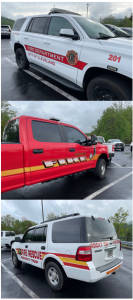 Editor’s Turn
Editor’s Turn
Last month, my husband and I took a two-week driving trip to historic sites in Virginia—Montpelier (James Madison), Red Hill (Patrick Henry), Woodrow Wilson’s birthplace and library, Appomattox Court House—and the Smoky Mountains.
Our hotel in Gatlinburg was atop a pretty big hill, with a steep road up to it (scary!). Awesome views. The Tennessee state fire chiefs convention was on, filling the hotel parking lot with very impressive, very clean vehicles. In a strange coincidence of timing, one morning while we waited for the elevator, the fire alarm rang, followed by ominous announcements. We hightailed it down 12 flights only to learn the cause was a stuck fan. No problem after all. Whew! But when we reached our car, the vehicles in the parking lot were being checked out–by a bear!
It turns out, a fire in the Smokies in 2016 reached and devastated Gatlinburg. Fourteen people died. The fire climbed the hillside to our hotel, and with only that one steep road in or out, hotel guests couldn’t evacuate. The building rapidly filled with smoke, but the firefighters stopped the blaze before it reached the hotel and caused an even greater tragedy. The fire chiefs chose that spot for their convention quite deliberately, I figure.
See you at the Orleans!